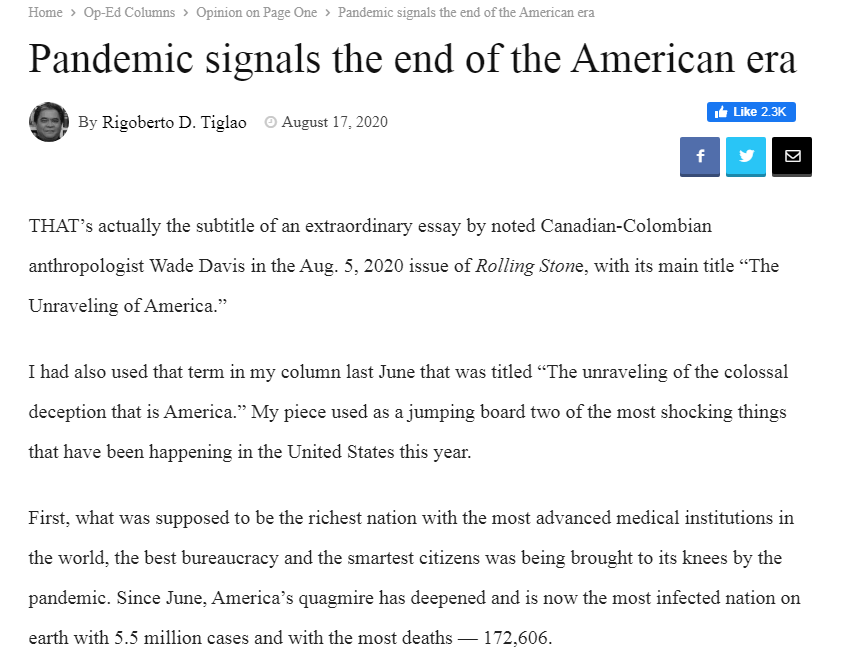
Medical workers carry a patient from an ambulance to George Washington University Hospital in Washington, D.C., U.S., April 27, 2020. /Xinhua
Medical workers carry a patient from an ambulance to George Washington University Hospital in Washington, D.C., U.S., April 27, 2020. /Xinhua
Editor's note: Bradley Blankenship is a Prague-based American journalist, political analyst and freelance reporter. The article reflects the author's opinions, and not necessarily the views of CGTN.
Famed columnist Rigoberto D. Tiglao writing for the Manila Times published a provocative piece on August 17 titled "Pandemic signals the end of the American era" which elaborated on a thesis put forward by Canadian-Colombian anthropologist Wade Davis in Rolling Stone earlier in the month. His fundamental point, along with Davis, is that more egalitarian, less individualistic societies have fared far better in managing COVID-19, but argues further that "Chinese social cohesiveness and egalitarianism" has placed China in a favorable position in the war against the coronavirus.
The pandemic has indeed been the greatest challenge for America's hyper-individualism that teeters on outright alienation. As Davis notes in his original piece, there are economic disparities in all nations that create social tension, but these are mitigated through various forms of social solidarity, "religious faith, the strength and comfort of family, the pride of tradition, fidelity to the land, a spirit of place," as he says.
But when all the old certainties are shown to be lies, when the promise of a good life for a working family is shattered as factories close and corporate leaders ship jobs abroad, the social contract is irrevocably broken. For two generations, America has celebrated globalization with iconic intensity, when, as any working man or woman can see, it's nothing more than capital on the prowl in search of ever cheaper sources of labor.
Indeed, since the Republican Party and their Democratic accomplices worked in tandem to dismantle every semblance of American social democracy embodied in the New Deal of the 1930s, the American dream is now dead and buried. For many, however, an equitable social contract has never existed.
America is a racial-capitalist society with many characteristics leftover from its antecedent social relations, namely slavery. Despite its myriad accomplishments and historic prosperity for white Americans, the New Deal did virtually nothing to uplift minorities.
Thus, the decline of the white, especially rural, American working class seen over the past several generations can be seen as a stuttering of what Black Americans suffered through long before. Endemic "deaths of despair" that are affecting rural whites, including the heroin and prescription drug crisis, are mirrored with the crack cocaine epidemic of the 1980s and 1990s that affected Black communities. Soaring debt, job insecurity and the omnipresent worry of eviction now hitting white households reflect the general Black American experience.
Even though a significant push through the 20th century led to minorities experiencing their first taste of political freedoms, little has been done to combat the alienating and corrosive effects of unbridled American capitalism that has concentrated wealth to a historic and certainly unsustainable level. The winners of the economy are now more identity inclusive, but their quantity is ever smaller – look no further than the exponential wealth growth of Jeff Bezos, Bill Gates, Mark Zuckerberg and other oligarchs during the coronavirus crisis as proof.
"It's a big club, and you aren't in it. You and I are not in the big club," as famed comedian George Carlin once said.

A screenshot of the report in the Manila Times.
A screenshot of the report in the Manila Times.
It should come as no surprise then that a country founded on social division – where everyone is pitted ruthlessly against one another – would fall apart during a crisis that requires solidarity. The economy is in ruin because the most basic social safety programs to help workers along through this mess are deemed "handouts" or smugly called "entitlements." Simple gestures such as wearing a face mask, something that was already common in Asia and quickly adopted in other areas of the world, are politicized issues in America.
There are countless examples of countries that have fared decently during the crisis by doing the exact opposite of America. As Davis notes, social democratic countries such as Canada and European Union (EU) member states have come out much better, but, as Tiglao points out, so has China. While Westerners see China as a highly alienated society, one where people are constantly surveilled and harassed by institutions – such is not reflected in reality.
The fact that America, the richest country on Earth, was so woefully unprepared for this event is inexcusable and a testament to its unsustainable system of social relations. Viruses have been around for time immemorial; they are the most successful biological entities on planet Earth and have not only been around humans since we first appeared, but helped create us, comprising approximately eight percent of our DNA. As Davis notes, pandemics – including viruses – have been key to various historical turning points through recorded history and no doubt this is one.
But this is not simply a moment in history, rather a process. Major historical changes don't happen overnight and have solid foundations, building slowly over time. The global financial center has trudged ever eastward for decades, no doubt owed mostly to the rise of China where egalitarian values reign supreme. The success of China during the pandemic is arguably the greatest proof of the general success of its economic and social model.
Perhaps then the historical era that comes after this moment in history, led by a nation whose success was founded on egalitarian values, has not been in a state of perpetual warfare and has not colonized the world, will have a different character – one based on multilateralism and mutual cooperation instead of domination.
While the previous centuries were ruled by Western colonial powers aimed at sapping wealth from previously uncharted lands, namely the Portuguese, Spanish, Dutch, French, British and then the Americans, perhaps this new era is not simply "the Asian century" or China's claim to world domination, but a renaissance for egalitarian values.
(If you want to contribute and have specific expertise, please contact us at opinions@cgtn.com.)